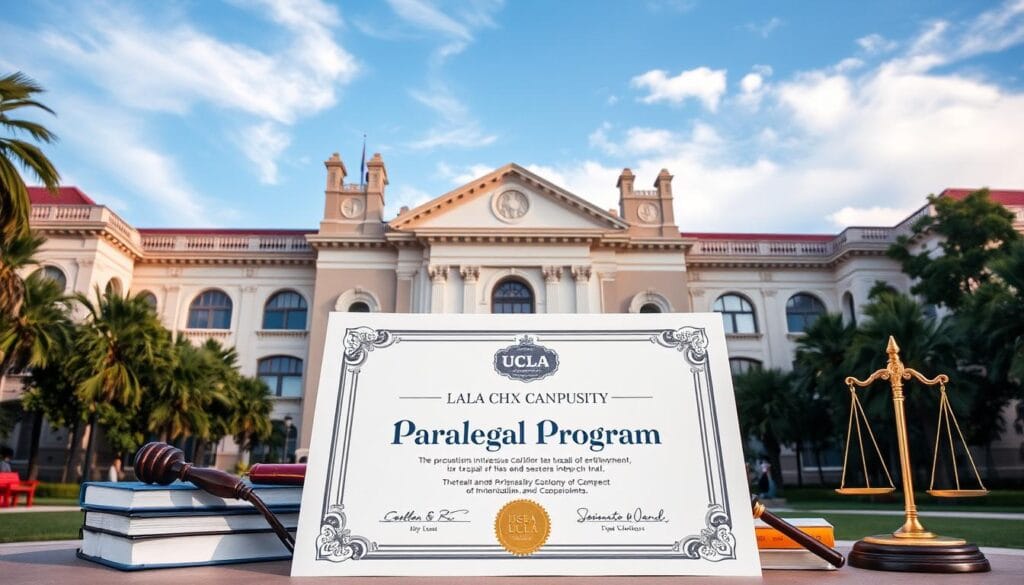Let’s talk about the UCLA Paralegal Program. If you’re thinking about jumping into the legal world without the full law school grind, this might be your ticket. I’ve spent years around paralegals—working with them, training them, watching them carve out careers—and I can tell you this program’s got a reputation for a reason. It’s not just a certificate you slap on your resume; it’s a serious step into a field that’s growing fast, especially in California. But before you get too excited, let’s break it down: what it is, what it takes to get in, and whether it’s worth your time and money.
Table of Contents
What’s the UCLA Paralegal Program All About?

Picture this: a program that’s been around long enough to know what it’s doing, approved by the American Bar Association (ABA), and run through UCLA Extension. That’s the UCLA Paralegal Program in a nutshell. It’s designed for people who want to work in law—think law firms, corporate legal departments, government agencies—without spending three years and a fortune on a JD. You’re learning the nuts and bolts: how to research case law, draft legal documents, understand ethics, and handle the real-world messiness of legal work.
It’s flexible, too. You can do it online with live classes or mix in some self-paced work, which is a godsend if you’re juggling a job or family. The curriculum’s broad but practical—stuff like business law, legal writing, and even oral communication skills, which trust me, you’ll need when you’re explaining complex stuff to clients or attorneys. Plus, there’s an internship component. That’s where the rubber meets the road—real legal work, not just textbook theory.
California’s paralegal market is heating up—15% job growth projected, according to the stats floating around. Law firms are hiring, corporations need in-house help, and government gigs are popping up. The median pay’s around $61,240 a year here, which beats the national average by a decent chunk . So, the demand’s there, and this program’s built to get you ready for it.
UCLA Paralegal Program: The Admission Hurdles
Now, let’s get to the part that trips people up: getting accepted. The UCLA Paralegal Program isn’t a free-for-all. They’re picky, and they should be—this isn’t some fly-by-night operation. The baseline? A bachelor’s degree. Doesn’t matter if it’s in English, biology, or basket weaving, as long as it’s from an accredited school. That’s the standard because they want people who’ve already proven they can handle college-level work. Legal studies are no joke; you’re digging into case law and writing briefs, so they need to know you won’t buckle under the pressure.
But here’s where it gets interesting. Don’t have a four-year degree? You’re not totally out of luck. If you’ve got an associate’s degree—say, 60 semester units or 90 quarter units—and some solid experience, you might still squeak in. We’re talking real experience, though—not just a summer gig making copies at a law firm. Maybe you’ve been a legal assistant for a few years, or you’ve worked in compliance or something adjacent. You’ll need to make a case for yourself, and that’s a separate, tougher application process. They’re looking for proof you can keep up, so your resume and personal statement better tell a damn good story.
The application itself isn’t rocket science, but it’s not a cakewalk either. You need official transcripts—sealed, legit ones—from every college you’ve attended. Letters of recommendation? Usually two, from people who can vouch for your brainpower or work ethic—professors, bosses, maybe a coworker who’s seen you shine. Then there’s the personal statement, 500-750 words where you explain why you want this and what you bring to the table . I’ve seen folks tank this part by being vague—don’t just say “I love law.” Tell them about that time you untangled a messy contract at work or stayed up late researching a case out of curiosity. Specifics win.
Deadlines are quarterly, and they’re strict—think November 12, 2024, for early 2025, or February 11, 2025, for April starts. Miss it, and you’re waiting months. Oh, and if you’re international, pile on TOEFL scores (100 minimum) and visa paperwork. It’s a lot, but it’s there to make sure you’re serious.
The admissions team doesn’t just rubber-stamp applications. They’re a screening committee, digging into your grades, your experience, your writing. They want to know you can handle the workload—36 quarter units of dense legal material—and thrive in a field where details matter. It’s not about perfection; it’s about readiness.

What You’ll Learn: The Meat of the Program
Once you’re in, what’s on the plate? The UCLA Paralegal Program’s curriculum is a mix of foundational stuff and hands-on skills. You’ve got core courses like Business Law Fundamentals, Legal Writing, and Oral Communication—basics that’ll carry you anywhere . Then there’s the fun stuff: specialized electives in corporate law, family law, criminal law, whatever grabs you. It’s not just theory; you’re learning how to draft motions, research statutes, and spot ethical red flags.
The internship’s a standout. You’re not stuck in a classroom—you’re out there, working on real cases, seeing how attorneys operate. I’ve talked to grads who say this was the game-changer—taking what they’d studied and applying it to a live deposition or a filing deadline. It’s messy, it’s stressful, and it’s exactly what prepares you for the job.
The program’s ABA approval means it meets California’s educational standards for paralegals, which is a big deal if you’re aiming for certifications like the NALA’s Certified Paralegal (CP) or NFPA’s PACE . Those aren’t required to work in California—there’s no state licensing—but they can make you stand out to employers.
UCLA Paralegal Program: What It Costs and How to Pay

Let’s talk money, because this isn’t cheap. Tuition’s in the $7,995-$10,000 range, depending on your track—standard certificate or the undergraduate version if you’re coming in with less than a bachelor’s . Add in a $1,750 application fee, plus books, tech for online classes, maybe parking if you’re in Westwood. It’s a chunk of change.
But here’s the good news: there’s help. UCLA Extension offers scholarships—think $2,500 from the Legacy of Judge Edward Rodgers or the Robert Wayne Pearce Investor Fraud Awareness Scholarship . Payment plans can spread it out, and federal aid’s an option if you hit deadlines like November 28, 2024, for January starts . Some folks even get their employers to chip in—smart move if you’re already in a related gig.
Is it worth it? Median paralegal pay in California’s $61,240, and with demand up, you could recoup that investment pretty quick . Compare that to law school’s six-figure price tag, and it’s a steal for what you’re getting.
Who’s This For? The Ideal Candidate
This program’s not for everyone. It’s intense—1 to 7 hours a week of work per class, plus internships—and it’s built for people who mean business . If you’re fresh out of high school with no direction, you’ll drown. But if you’ve got a degree, some life experience, and a itch to break into law, this could be your sweet spot.
I’ve seen all types thrive here: career-changers tired of dead-end jobs, undergrads testing the legal waters before law school, even military vets leveraging their discipline into a new field . What ties them together is grit and a knack for details. Paralegals live in the weeds—organizing case files, spotting inconsistencies in documents—and this program drills that into you.
The Payoff: Jobs and Beyond
Finish this, and you’re not just certified—you’re employable. California’s got no mandatory licensing, so with UCLA’s stamp, you’re ready to roll . Law firms love grads who can hit the ground running—researching, drafting, managing chaos. Corporate legal departments need people who get business law. Government agencies want ethical, detail-oriented pros. And if you grab a certification like NALA’s CP or NFPA’s PACE, you’re golden—more credibility, better pay, bigger opportunities.
The network’s a bonus, too. UCLA’s career services don’t mess around—job boards, resume help, connections to alumni who’ve been there . I’ve seen grads land gigs within months, pulling $50,000-$70,000 to start, depending on experience and location.
Conclusion
Here’s the bottom line. The UCLA Paralegal Program is a grind—tough to get into, tough to finish—but it’s a straight shot to a solid career. You’ll need a bachelor’s or a hell of a backstory, a decent chunk of cash, and the stomach for hard work. In return, you get practical skills, a shot at a growing field, and a credential that carries weight.
If you’re sitting there wondering if it’s for you, ask yourself: Do I love digging into details? Can I handle deadlines and pressure? Am I ready to invest in something that pays off? If that’s a yes, start pulling your transcripts together. This could be the move that changes everything.
FAQ
What are the admission requirements for the UCLA Paralegal Program?
You’ll need a bachelor’s degree from an accredited school. No degree? An associate’s with strong legal experience might work, but it’s a tougher path.
How much does the UCLA Paralegal Program cost?
Tuition runs $7,995-$10,000, plus a $1,750 fee. Scholarships and payment plans can help soften the blow.
Is the UCLA Paralegal Program worth it for a career?
Yes, if you want a legal job without law school. California’s market is growing, and grads earn a median of $61,240 annually.

